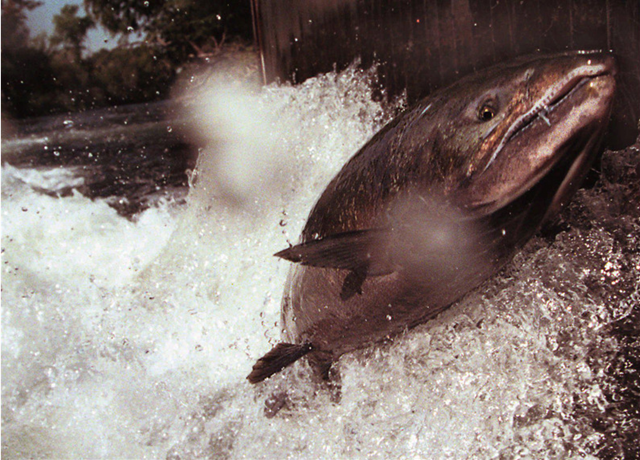Salmon fishermen losing water war with desperate California farmers
By COLIN SULLIVAN of Greenwire
Published: April 2, 2010 SAN FRANCISCO — California congressmen George Miller and Mike Thompson stumped for salmon fishermen yesterday during a political rally here meant to counter the political muscle of San Joaquin Valley farmers who tend to get more media attention in the long-running war over the state’s strained water supply. The Democratic lawmakers represent Northern California districts that were once home to some of the nation’s most active king, or chinook, salmon runs. But the California and Oregon salmon fishery that largely starts in the Sacramento River north of the Sacramento-San Joaquin River Delta has collapsed. There were 28,000 naturally spawning Central Valley salmon caught in 2009, down from nearly 700,000 wild salmon harvested as recently as 2000. The plummeting catch has led to the cancellation of the commercial salmon season the past two years, causing the loss of 23,000 jobs and $2 billion in revenue, according to a study by Southwick Associates, an analytical firm that specializes in resource issues. Commercial salmon fishermen blame the agriculture industry for the fishery’s collapse — namely, Central Valley farmers who have seen their share of water from federal and state sources steadily increase in recent years. Water exports from the delta, the fishermen say, had reached record highs from 2003 to 2007, prior to the fishery collapse and the implementation of pumping limits under the federal Endangered Species Act. … Miller, who is now in his 18th term on Capitol Hill and whose father fought the same water fights as a state senator, has long been an advocate of the fishing community. He is also the lawmaker most likely to take on Sen. Dianne Feinstein (D-Calif.), who many in the fishing industry view as their nemesis. In a swipe at the state’s senior U.S. senator, Miller said the recent National Academy of Sciences review of the science behind a salmon recovery plan confirms that rolling back the Endangered Species Act to allow more water to flow to farmers should not be on the table. “This system has to be looked at as a waterway of national significance,” said Miller, comparing the delta to the Everglades and the Chesapeake Bay. “This is the beginning of a long struggle to right what is wrong.” … Larry Collins, a commercial angler based in Fisherman’s Wharf and president of the Crab Boat Owners Association of San Francisco, said the industry is making a concerted effort to counter “agribusiness bigwigs” who he accuses of stealing water. Collins concedes that many in the state have started to view the fishermen as something of a dying breed, but he said restoration of wild salmon is still possible if voters start paying attention. “We’ve lost 80 percent of our fleet in the last 25 years,” Collins said, citing a drop in state-issued fishing permits from 5,000 in 1985 to about 1,200 today. “I don’t think the farmers can say that.” Key to their strategy is the species-protection law, which has forced a federal judge to place limits on how much water can be pumped from the delta. Spring-run and winter-run chinook salmon are listed as endangered already, and the fall-run may not be far behind. “The [Endangered Species Act] has been the key to holding the line,” said Jim McCarthy, of Salmon Water Now. “These environmental protections are really all these fisherman have.”
Salmon Fishermen Swim Against Political Tide in Long-Running Calif. Water War
